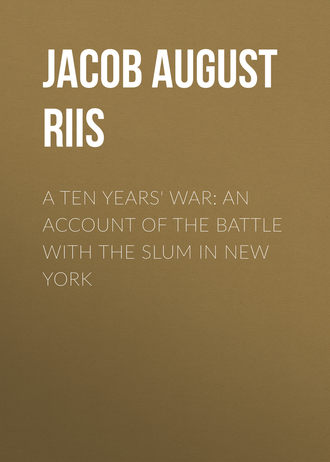 полная версия
полная версияA Ten Years' War: An Account of the Battle with the Slum in New York
The Jews under the stairs had two children. The shoemaker in the cellar next door has three. They were fighting and snarling like so many dogs over the coarse food on the table before them, when we looked in. The baby, it seems, was the cause of the row. He wanted it all. He was a very dirty and a very fierce baby, and the other two children were no match for him. The shoemaker grunted fretfully at his last, "Ach, he is all de time hungry!" At the sight of the policeman, the young imp set up such a howl that we beat a hasty retreat. The cellar "flat" was undoubtedly in violation of law, but it was allowed to pass. In the main hall, on the ground floor, we counted seventeen children. The facts of life here suspend ordinary landlord prejudices to a certain extent. Occasionally it is the tenant who suspends them. The policeman laughed as he told me of the case of a mother who coveted a flat into which she well knew her family would not be admitted; the landlord was particular. She knocked, with a troubled face, alone. Yes, the flat was to let; had she any children? The woman heaved a sigh. "Six, but they are all in Greenwood." The landlord's heart was touched by such woe. He let her have the flat. By night he was amazed to find a flock of half a dozen robust youngsters domiciled under his roof. They had indeed been in Greenwood; but they had come back from the cemetery to stay. And stay they did, the rent being paid.
High rents, slack work, and low wages go hand in hand in the tenements as promoters of overcrowding. The rent is always one fourth of the family income, often more. The fierce competition for a bare living cuts down wages; and when loss of work is added, the only thing left is to take in lodgers to meet the landlord's claim. The Jew usually takes them singly, the Italian by families. The midnight visit of the sanitary policeman discloses a state of affairs against which he feels himself helpless. He has his standard: 400 cubic feet of air space for each adult sleeper, 200 for a child. That in itself is a concession to the practical necessities of the case. The original demand was for 600 feet. But of 28,000 and odd tenants canvassed in New York, in the slumming investigation prosecuted by the general government in 1894, 17,047 were found to have less than 400 feet, and of these 5526 slept in unventilated rooms with no windows. No more such rooms have been added since; but there has come that which is worse.
It was the boast of New York, till a few years ago, that at least that worst of tenement depravities, the one-room house, too familiar in the English slums, was practically unknown here. It is not so any longer. The evil began in the old houses in Orchard and Allen streets, a bad neighborhood, infested by fallen women and the thievish rascals who prey upon their misery,—a region where the whole plan of humanity, if plan there be in this disgusting mess, jars out of tune continually. The furnished-room house has become an institution here, speeded on by a conscienceless Jew who bought up the old buildings as fast as they came into the market, and filled them with a class of tenants before whom charity recoils, helpless and hopeless. When the houses were filled, the crowds overflowed into the yard. In one case, I found, in midwinter, tenants living in sheds built of odd boards and roof tin, and paying a dollar a week for herding with the rats. One of them, a red-faced German, was a philosopher after his kind. He did not trouble himself to get up, when I looked in, but stretched himself in his bed,—it was high noon,—responding to my sniff of disgust that it was "sehr schoen! ein bischen kalt, aber was!" His neighbor, a white-haired old woman, begged, trembling, not to be put out. She would not know where to go. It was out of one of these houses that Fritz Meyer, the murderer, went to rob the poorbox in the Redemptorist Church, the night when he killed policeman Smith. The policeman surprised him at his work. In the room he had occupied I came upon a brazen-looking woman with a black eye, who answered the question of the officer, "Where did you get that shiner?" with a laugh. "I ran up against the fist of me man," she said. Her "man," a big, sullen lout, sat by, dumb. The woman answered for him that he was a mechanic.
"What does he work at?" snorted the policeman, restraining himself with an effort from kicking the fellow.
She laughed scornfully. "At the junk business." It meant that he was a thief.
Young men, with blotched faces and cadaverous looks, were loafing in every room. They hung their heads in silence. The women turned their faces away at the sight of the uniform. They cling to these wretches, who exploit their starved affections for their own ease, with a grip of desperation. It is their last hold. Women have to love something. It is their deepest degradation that they must love these. Even the wretches themselves feel the shame of it, and repay them by beating and robbing them, as their daily occupation. A poor little baby in one of the rooms gave a shuddering human touch to it all.
The old houses began it, as they began all the tenement mischief that has come upon New York. But the opportunity that was made by the tenant's need was not one to be neglected. In some of the newer tenements, with their smaller rooms, the lodger is by this time provided for in the plan, with a special entrance from the hall. "Lodger" comes, by an easy transition, to stand for "family." Only the other night I went with the sanitary police on their midnight inspection through a row of Elizabeth Street tenements which I had known since they were built, fifteen or sixteen years ago. That is the neighborhood in which the recent Italian immigrants crowd. In the house which we selected for examination, in all respects the type of the rest, we found forty-three families where there should have been sixteen. Upon each floor were four flats, and in each flat three rooms that measured respectively 14 x 11, 7 x 11, and 7 x 8-1/2 feet. In only one flat did we find a single family. In three there were two to each. In the other twelve each room had its own family living and sleeping there. They cooked, I suppose, at the one stove in the kitchen, which was the largest room. In one big bed we counted six persons, the parents and four children. Two of them lay crosswise at the foot of the bed, or there would not have been room. A curtain was hung before the bed in each of the two smaller rooms, leaving a passageway from the hall to the main room. The rent for the front flats was twelve dollars; for that in the rear ten dollars. The social distinctions going with the advantage of location were rigidly observed, I suppose. The three steps across a tenement hall, from the front to "the back," are often a longer road than from Ludlow Street to Fifth Avenue.
They were sweaters' tenements. But I shall keep that end of the story until I come to speak of the tenants. The houses I have in mind now. They were Astor leasehold property, and I had seen them built upon the improved plan of 1879, with air shafts and all that. There had not been water in the tenements for a month then, we were told by the one tenant who spoke English that could be understood. The cold snap had locked the pipes. Fitly enough, the lessee was an undertaker, an Italian himself, who combined with his business of housing his people above and below the ground that of the padrone, to let no profit slip. He had not taken the trouble to make many or recent repairs. The buildings had made a fair start; they promised well. But the promise had not been kept. In their premature decay they were distinctly as bad as the worst. I had the curiosity to seek out the agent, the middleman, and ask him why they were so. He shrugged his shoulders. With such tenants nothing could be done, he said. I have always held that Italians are most manageable, and that, with all the surface indications to the contrary, they are really inclined to cleanliness, if cause can be shown, and I told him so. He changed the subject diplomatically. No doubt it was with him simply a question of the rent. They might crowd and carry on as they pleased, once that was paid; and they did. It used to be the joke of Elizabeth Street that when the midnight police came, the tenants would keep them waiting outside, pretending to search for the key, until the surplus population of men had time to climb down the fire escape. When the police were gone they came back. We surprised them all in bed.
Like most of the other tenements we have come across on our trip, these were double-deckers. That is the type of tenement that is responsible for the crowding that goes on unchecked. It is everywhere replacing the older barracks, as they rot or are torn down.
This double-decker was thus described by the Tenement House Committee of 1894: "It is the one hopeless form of tenement construction. It cannot be well ventilated, it cannot be well lighted; it is not safe in case of fire. It is built on a lot 25 feet wide by 100 or less in depth, with apartments for four families in each story. This necessitates the occupation of from 86 to 90 per cent. of the lot's depth. The stairway, made in the centre of the house, and the necessary walls and partitions reduce the width of the middle rooms (which serve as bedrooms for at least two people each) to 9 feet each at the most, and a narrow light and air shaft, now legally required in the centre of each side wall, still further lessens the floor space of these middle rooms. Direct light is only possible for the rooms at the front and rear. The middle rooms must borrow what light they can from dark hallways, the shallow shafts, and the rear rooms. Their air must pass through other rooms or the tiny shafts, and cannot but be contaminated before it reaches them. A five-story house of this character contains apartments for eighteen or twenty families, a population frequently amounting to 100 people, and sometimes increased by boarders or lodgers to 150 or more."
The committee, after looking in vain through the slums of the Old World cities for something to compare the double-deckers with, declared that, in their setting, the separateness and sacredness of home life were interfered with, and evils bred, physical and moral, that "conduce to the corruption of the young." The statement needs no argument to convince.
Yet it is for these that the "interests" of which the fire chief spoke rush into battle at almost every session of the legislature, whenever a step, no matter how short and conservative, is to be taken toward their improvement. No winter has passed, since the awakening conscience of the people of New York city manifested itself in a desire to better the lot of the other half, that has not seen an assault made, in one shape or another, on the structure of tenement house law built up with such anxious solicitude. Once a bill to exempt from police supervision, by withdrawing them from the tenement house class, the very worst of the houses, whose death rate threatened the community, was sneaked through the legislature all unknown, and had reached the executive before the alarm was sounded. The governor, put upon his guard, returned the bill, with the indorsement that he was unable to understand what could have prompted a measure that seemed to have reason and every argument against it, and none for it. But the motive is not so obscure, after all. It is the same old one of profit without conscience. It took from the Health Department the supervision of the light, ventilation, and plumbing of the tenements, which by right belonged there, and put it in charge of a compliant Building Department, "for the convenience of architects and their clients, and the saving of time and expense to them." For the convenience of the architect's client, the builder, the lot was encroached upon, until of one big block which the Tenement House Committee measured only 7 per cent. was left uncovered for the air to struggle through; 93 per cent. of it was covered with brick and mortar. Rear tenements, to the number of nearly 100, have been condemned as "slaughter houses," with good reason, but this block was built practically solid. The average of space covered in 34 tenement blocks was shown to be 78.13 per cent. The law allowed only 65. The "discretion" that pens tenants in a burning tenement with stairs of wood for the builder's "convenience" cut down the chance of life of their babies unmoved. Sunlight and air mean just that, where three thousand human beings are packed into a single block. That was why the matter was given into the charge of the health officials, when politics was yet kept out of their work.
Of such kind are the interests that oppose betterment of the worker's hard lot in New York; that dictated the appointment by Tammany of a commission composed of builders to revise its code of building laws, and that sneer at the "laughable results of the late Tenement House Committee." Those results made for the health and happiness and safety of a million and a half of souls, and were accounted, on every humane ground, the longest step forward that had yet been taken by this community. For the old absentee landlord, who did not know what mischief was afoot, we have got the speculative builder, who does know, but does not care so long as he gets his pound of flesh. Half of the just laws that have been passed for the relief of the people he has paralyzed with his treacherous discretion clause, carefully nursed in the school of practical politics to which he gives faithful adherence. The thing has been the curse of our city from the day when the earliest struggle toward better things began. Among the first manifestations of that was the prohibition of soap factories below Grand Street by the act of 1797, which created a Board of Health with police powers. The act was passed in February, to take effect in July; but long before that time the same legislature had amended it by giving the authorities discretion in the matter. And the biggest soap factory of them all is down there to this day, and is even now stirring up a rumpus among the latest immigrants, the Syrians, who have settled about it. No doubt it is all a question of political education; but are not a hundred years enough to settle this much, that compromise is out of place where the lives of the people are at stake, and that it is time our years of "discretion" were numbered?
And, please God, the time is at hand. Here, set in its frame of swarming tenements, is a wide open space, some time, when enough official red tape has been unwound, to be a park, with flowers and grass and birds to gladden the hearts of those to whom such things have been as tales that are told, all these dreary years, and with a playground in which the children of yonder big school may roam at will, undismayed by landlord or policeman. Not all the forces of reaction can put back the barracks that were torn down as one of the "laughable results" of that very Tenement House Committee's work, or restore to the undertaker his profits from Bone Alley of horrid memory. It was the tenant's turn to laugh, that time. Down half a dozen blocks, among even denser swarms, is another such plot, where football and a skating pond are being planned by the children's friends. We shall hear the story of these yet, and rejoice that the day of reckoning is coming for the builder without a soul. Till then let him deck the fronts of his tenements with bravery of plate glass and brass to hide the darkness within. He has done his worst.
We can go no further. Yonder lies the river. A full mile we have come, through unbroken ranks of tenements with their mighty, pent-up multitudes. Here they seem, with a common impulse, to overflow into the street. From corner to corner it is crowded with girls and children dragging babies nearly as big as themselves, with desperate endeavor to lose nothing of the show. There is a funeral in the block. Unnumbered sewing-machines cease for once their tireless rivalry with the flour mill in the next block, that is forever grinding in a vain effort to catch up. Heads are poked from windows. On the stoops hooded and shawled figures have front seats. The crowd is hardly restrained by the policeman and the undertaker in holiday mourning, who clear a path by force to the plumed hearse. The eager haste, the frantic rush to see,—what does it not tell of these starved lives, of the quality of their aims and ambitions? The mill clatters loudly: there is one mouth less to fill. In the midst of it all, with clamor of urgent gong, the patrol wagon rounds the corner, carrying two policemen precariously perched upon a struggling "drunk," a woman. The crowd scatters, following the new sensation. The tragedies of death and life in the slum have met together.
Many a mile I might lead you along these rivers, east and west, through the island of Manhattan, and find little else than we have seen. The great crowd is yet below Fourteenth Street, but the northward march knows no slackening of pace. As the tide sets uptown, it reproduces faithfully the scenes of the older wards, though with less of their human interest than here where the old houses, in all their ugliness, have yet some imprint of the individuality of their tenants. Only on feast days does Little Italy, in Harlem, recall the Bend when it put on holiday attire. Anything more desolate and disheartening than the unending rows of tenements, all alike and all equally repellent, of the uptown streets, it is hard to imagine. Hell's Kitchen in its ancient wickedness was picturesque, at least, with its rocks and its goats and shanties. Since the negroes took possession it is only dull, except when, as happened last summer, the remnant of the Irish settlers make a stand against the intruders. Vain hope! Perpetual eviction is their destiny. Negro, Italian, and Jew, biting the dust with many a bruised head under the Hibernian's stalwart fist, resistlessly drive him before them, nevertheless, out of house and home. The landlord pockets the gate money. The old robbery still goes on. Where the negro pitches his tent, he pays more rent than his white neighbor next door, and is a better tenant. And he is good game forever. He never buys the tenement, as the Jew or the Italian is likely to do, when he has scraped up money enough to reënact, after his own fashion, the trick taught him by his oppressor. The black column has reached the hundredth street on the East Side, and the sixties on the West,2 and there for the present it halts. Jammed between Africa, Italy, and Bohemia, the Irishman has abandoned the East Side uptown. Only west of Central Park does he yet face his foe, undaunted in defeat as in victory. The local street nomenclature, in which the directory has no hand,—Nigger Row, Mixed Ale Flats, etc.,—indicates the hostile camps with unerring accuracy.
Uptown or downtown, as the tenements grow taller, the thing that is rarest to find is the home of the olden days, even as it was in the shanty on the rocks. "No home, no family, no morality, no manhood, no patriotism!" said the old Frenchman. Seventy-seven per cent. of their young prisoners, say the managers of the state reformatory, have no moral sense, or next to none. "Weakness, not wickedness, ails them," adds the prison chaplain; no manhood, that is to say. Years ago, roaming through the British Museum, I came upon an exhibit that riveted my attention as nothing else had. It was a huge stone arm, torn from the shoulder of some rock image, with doubled fist and every rigid muscle instinct with angry menace. Where it came from or what was its story I do not know. I did not ask. It was its message to us I was trying to read. I had been spending weary days and nights in the slums of London, where hatred grew, a noxious crop, upon the wreck of the home. Lying there, mute and menacing, the great fist seemed to me like a shadow thrown from the gray dawn of the race into our busy day with a purpose, a grim, unheeded warning. What was it? In the slum the question haunts me yet. They perished, the empires those rock-hewers built, and the governments reared upon their ruins are long since dead and forgotten. They were born to die, for they were not built upon human happiness, but upon human terror and greed. We built ours upon the bed rock, and its cornerstone is the home. With this bitter mockery of it that makes the slum, can it be that the warning is indeed for us?
III
THE TENEMENT: CURING ITS BLIGHT
I stood at Seven Dials and heard the policeman's account of what it used to be. Seven Dials is no more like the slum of old than is the Five Points to-day. The conscience of London wrought upon the one as the conscience of New York upon the other. A mission house, a children's refuge, two big schools, and, hard by, a public bath and a wash house stand as the record of the battle with the slum, which, with these forces in the field, has but one ending. The policeman's story rambled among the days when things were different. Then it was dangerous for an officer to go alone there at night.
Around the corner there came from one of the side streets a procession with banners, parading in honor and aid of some church charity. We watched it pass. In it marched young men and boys with swords and battle-axes, and upon its outskirts skipped a host of young roughs—so one would have called them but for the evidence of their honest employment—who rattled collection boxes, reaping a harvest of pennies from far and near. I looked at the battle-axes and the collection boxes, and thought of forty years ago. Where were the Seven Dials of that day, and the men who gave it its bad name? I asked the policeman.
"They were druv into decency, sor," he said, and answered from his own experience the question ever asked by faint-hearted philanthropists. "My father, he done duty here afore me in '45. The worst dive was where that church stands. It was always full of thieves,"—whose sons, I added mentally, have become collectors for the church. The one fact was a whole chapter on the slum.
London's way with the tenant we adopted at last in New York with the slum landlord. He was "druv into decency." We had to. Moral suasion had been stretched to the limit. The point had been reached where one knock-down blow outweighed a bushel of arguments. It was all very well to build model tenements as object lessons to show that the thing could be done; it had become necessary to enforce the lesson by demonstrating that the community had power to destroy houses which were a menace to its life. The rear tenements were chosen for this purpose.
They were the worst as they were the first of New York's tenements. The double-deckers of which I have spoken had, with all their evils, at least this to their credit, that their death rate was not nearly as high as that of the old houses. That was not because of any virtue inherent in the double-deckers, but because the earlier tenements were old, and built in a day that knew nothing of sanitary restrictions, and cared less. Hence the showing that the big tenements had much the lowest mortality. The death rate does not sound the depths of tenement house evils, but it makes a record that is needed when it comes to attacking property rights. The mortality of the rear tenements had long been a scandal. They are built in the back yard, generally back to back with the rear buildings on abutting lots. If there is an open space between them, it is never more than a slit a foot or so wide, and gets to be the receptacle of garbage and filth of every kind; so that any opening made in these walls for purposes of ventilation becomes a source of greater danger than if there were none. The last count that was made, in 1898, showed that among the 40,958 tenements in New York there were still 2379 rear houses left. Where they are the death rate rises, for reasons that are apparent. The sun cannot reach them. They are damp and dark, and the tenants, who are always the poorest and most crowded, live "as in a cage open only toward the front," said the Tenement House Committee. A canvass made of the mortality records by Dr. Roger S. Tracy, the registrar of records, showed that while in the First Ward (the oldest), for instance, the death rate in houses standing singly on the lot was 29.03 per 1000 of the living, where there were rear houses it rose to 61.97. The infant death rate is a still better test: that rose from 109.58 in the single tenements of the same ward to 204.54 where there were rear houses. One in every five babies had to die, that is to say; the house killed it. No wonder the committee styled the rear tenements "slaughter houses," and called upon the legislature to root them out, and with them every old, ramshackle, disease-breeding tenement in the city.











